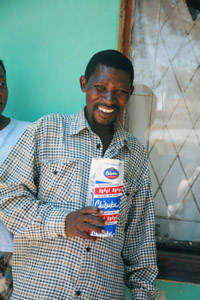Nursing a hangover
The levy imposed on alcohol was implemented on 1 November 2008 after KBL and BBL withdrew their court case against the proposed measure.
The government had initially proposed a 70 percent tax on all alcoholic beverages but cut it down to 30 percent after public outcry at the absurdity of the measure.
The beer business in Botswana, a landlocked country to the north of South Africa with only 1.6 million inhabitants, has taken a nosedive since the tax was introduced last year.
Those Botswanans who used to drink the ever so popular beer cans are now drinking quarts (750 ml bottles) because a quart of Black Label, they say, gives them a better value than a can of St Louis.
Even though the quart costs 12 pula (EUR 1.2) to the St Louis can’s seven pula, the quart bottle is returnable and a customer gets back a one pula deposit – plus it can be shared by at least two people.
Consumers who once drank popular brands such as St Louis, Castle, Hansa or Heineken have since switched to Windhoek Lager, which costs just six pula. It is the cheapest mainstream beer in the country but is brewed across the border in Namibia.
Other drinkers have turned their loyalties to Chibuku, the traditional local sorghum brew produced by BBL.
The preferred beer of the working classes, Chibuku, even after the levy, is a bargain at 4.50 pula a litre and it is common to find five friends sharing one.
Before the introduction of the levy, Botswanans were among Africa’s most beer-loving consumers. SABMiller say that the beer market (lager beer) represented 580,000 hl of which KBL brewed 560,000 annually. Hence lager beer consumption came to 34 litres per capita. Now add to that the sorghum beer volume – 2.6 million hl according to SABMiller – and total per capita consumption of beer was closer to 190 litres per capita.
In June, that is seven months after the introduction of the levy, employees of KBL and BBL took to the streets in protest because the surcharge had resulted in job losses and had begun to threaten the whole industry.
In their petition, KBL and BBL called on the government to axe the levy or reduce it to save further job losses. The employees said while they understood the government’s war on alcohol, it should consider other alternatives of reducing alcohol abuse.
According to local media reports, the workers said that since the introduction of the levy, retrenchments had hit the two companies to the point where even remaining employees were under threat.
In their petition they said further that the levy had also resulted in locally produced alcohol becoming more expensive than imported alcohol, as the tax did not affect imported alcohol.
President Khama, who took over office in April 2008, wants to reduce alcohol consumption to fight crime, road accidents and the spread of HIV, the virus that causes AIDS. Botswana has the world’s second-highest HIV-infection rate, after Swaziland, according to the United Nations’ AIDS agency.
The introduction of the levy was complemented by other government efforts to reduce alcohol consumption, including education programmes at schools and promoting alcohol-free youth activities through sports and entertainment.
A national survey found that 18 percent of children in Botswana consumed alcohol by the time they reached the age of 13, and the rate rose to 72 percent by the time they reached 17.

